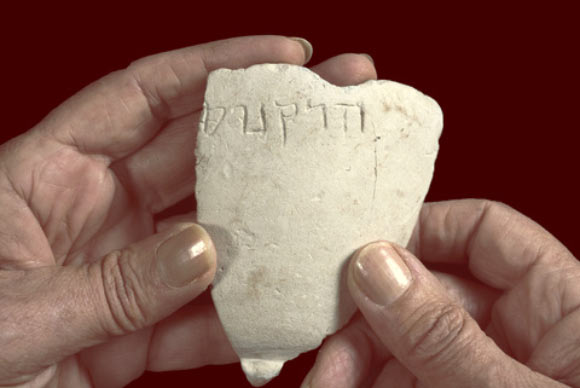Archaeologists digging at a site in the City of David, in the Jerusalem Walls National Park, have found a fragment of a rare ancient bowl.

The fragment of the 2,100-year-old stone bowl, which is engraved with the name Hyrcanus. Image credit: Clara Amit / Israel Antiquities Authority.
The bowl fragment — made from chalk — dates to about 100 BC (Hasmonean period) and bears the name ‘Hyrcanus’ in Hebrew script.
“This is one of the earliest examples of chalk vessels to appear in Jerusalem,” said Israel Antiquities Authority archaeologist Dr. Doron Ben-Ami and Bar-Ilan University Professor Esther Eshel.
“These stone vessels were extensively used by Jews because they were considered vessels that cannot become ritually unclean.”
The fragment was found beneath the foundations of a miqwe, which was part of a complex of water installations that were used for ritual bathing.
The archaeologists said: “was Hyrcanus, whose name is engraved on the bowl, a high-ranking person, or perhaps simply an ordinary citizen during the Hasmonean period? It is difficult to ascertain.”
“Since there are few vessels in the archaeological record of this period which are engraved with names, it is not known whether this type of engraving was a routine act or a special tribute.”
“The name Hyrcanus was fairly common in the Hasmonean period,” they added.
“We know of two personages from this period who had this name: John Hyrcanus, who was the grandson of Matityahu the Hasmonean and ruled Judea from 135–104 BC, and John Hyrcanus II, who was the son of Alexander Jannaeus and Salome Alexandra; however, it is not possible to determine if the bowl belonged specifically to either of them.”
“About a year ago remains of the Greek (Seleucid) Akra were discovered at the site in the City of David.”
“This was the famous fortress built by Antiochus IV Epiphanes in order to control the city and monitor the activity in the Temple, which was eventually conquered by the Hasmoneans.”
“Interestingly, the bowl was found a short distance from where the remains of the Akra were revealed.”







